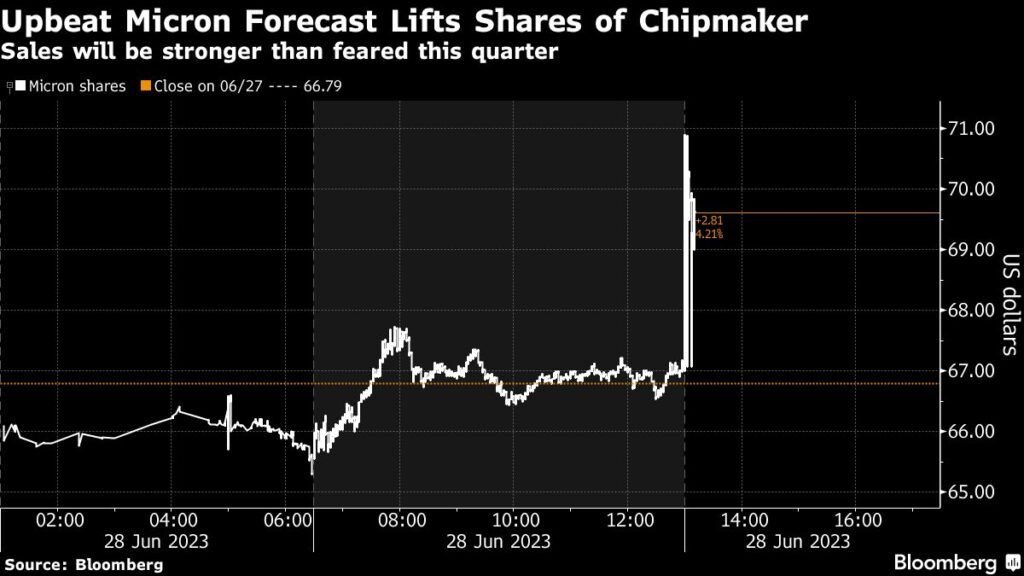(Bloomberg) — Micron Technology Inc. gave an upbeat forecast for the current period, indicating that an industry glut is easing even as the chipmaker continues to face challenges in China.
Most Read from Bloomberg
Sales will be as much as $4.1 billion in the fiscal fourth quarter, the company said in a statement Wednesday. That compares with an average analyst estimate of $3.87 billion.
“We believe that the memory industry has passed its trough in revenue, and we expect margins to improve as industry supply-demand balance is gradually restored,” Chief Executive Officer Sanjay Mehrotra said in the statement. But recent actions in China — where the government has decided that Micron’s products are a security risk — “is a significant headwind that is impacting our outlook and slowing our recovery,” he said.
Like many of its peers, Micron has suffered a collapse in orders for its products after sluggish demand for smartphones and personal computers led to a buildup of inventory. The company’s projection indicates that customers have worked through those stockpiles and are now returning to purchasing again.
The shares, which had already gained 34% this year, rose about 2% in extended trading. They had closed at $67.07 in New York.
Micron, the largest US maker of memory chips, is projecting a loss of about $1.12 to $1.26 a share in the current period, compared with an estimated $1.10 loss.
Micron’s chips, which help store and handle information, are particularly vulnerable to swings in demand because memory products are directly interchangeable and traded like commodities.
Rapid fluctuations in the balance between supply and demand can leave producers selling the components for less than they cost to make. Micron is also up against formidable rivals in South Korea: Samsung Electronics Co. and SK Hynix Inc.
Though Micron’s customers are emerging from a pile of excess inventory, the company isn’t predicting a rapid return to growth in 2023. PC shipments are expected to decline by a “low double-digit” percentage from a year ago, slumping to a level that’s below where that market was before the pandemic. The smartphone industry will contract by a percentage in the mid-single digits from a year ago, Micron predicted.
Prior to disruptions caused by the pandemic, Micron’s management had argued that the spread of memory chips to more markets would help prevent another boom-and-bust cycle. And even now, Mehrotra and his team maintain that once this current set of unusual circumstances is over – the global pandemic, a war in Europe and supply chain disruptions — the industry will return to long-term profitable growth.
But unlike its Korean competitors, Micron has also fallen prey to the geopolitical rivalry between China and the US. The Cybersecurity Administration of China has probed the company and barred its chips from critical infrastructure.
The Boise, Idaho-based company has warned that about half of its sales tied to China-headquartered clients may be affected by the probe. That represents a “low-double-digit percentage” of its global revenue.
Mehrotra said on a conference call with analysts the situation in China remains “uncertain and fluid.”
“Micron is working to mitigate this impact over time and expects increased quarter-to-quarter revenue variability,” he said. The company’s “long-term goal” is to retain its global market share, Mehrotra said.
Several of Micron’s customers are being contacted by officials as part of the China investigation, which was announced earlier this year. Micron’s revenue with businesses based in mainland China and Hong Kong, including direct sales as well as indirect sales through distributors, accounts for about a quarter of the company’s total.
In the three months ended June 1, Micron’s revenue declined 57% to $3.75 billion. The company had a loss of $1.43 a share, excluding certain items. That compares with an average estimate of a loss of $1.59 a share and sales of $3.69 billion.
(Updates with more CEO comments in 13th paragraph.)
Most Read from Bloomberg Businessweek
©2023 Bloomberg L.P.


